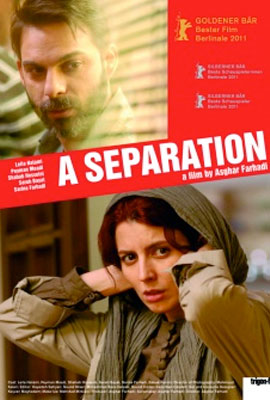
(2011)
directed by Asghar Farhadi
“A Separation” shows us how good people who are trying to do the right thing can end up in a desperate disagreement that defies all attempts to find a resolution. We can see the logic of each person’s position. At the same time, we feel strong emotions which pull us in different directions. “A Separation” involves its audience in an unusually direct way. I found myself absolutely transfixed by the unhappy family situation presented in this extraordinarily intelligent film.
After a long bureaucratic process, a middle-class couple, Nader and his wife, Simin, have been granted a visa to move abroad with their intelligent, sensitive eleven year old daughter, Termeh. They both believe Termeh will have a better life if they leave Iran. The part of Termeh is beautifully played by the director’s own daughter, Sarina Farhadi. Nader and Simin are both very supportive of their daughter’s education. They have hired a teacher from her school to come to their home to give Termeh extra coaching for important upcoming exams.
Nader and Simin love each other and want the best for their daughter, but they are divided on what to do. The visa will expire in forty days and does not include Nader’s father. Simin is ready to leave, but Nader insists on staying in Tehran to care for his elderly father, who suffers from dementia and needs constant attention. “But he doesn’t know you!” his wife says. “No, but I know him.” Nader replies. “Doesn’t your daughter’s future matter to you?” Simin asks her husband.
According to Islamic law, as long as they remain married, Simin cannot leave the country without her husband’s permission. Convinced that there is no other solution and motivated by her love for her daughter, Simin moves to her mother’s apartment and, as a necessity, sues for divorce, even though the two would prefer to remain married.
“A Separation” offers a rare glimpse into the lives of Iran’s middle class and the culture’s patriarchal and class-based society. It is harrowing to watch how decisions made by Nader and Simin send out ripples that effect not only their own family but other families as well. “A Separation” examines issues of gender, religion, class, and justice.
The couple’s Tehran apartment features numerous internal windows and glass partitions. In many shots, the characters view one another through the doors and partitions while, at the same time, they are separated and cannot hear or speak to one another. These shots emphasize the characters’ different points of view and their emotional estrangement.
Nader’s decision to hire Razieh, a devout Muslim woman from the nation’s lower class, to care for his father is an absolute disaster for everyone concerned. Razieh keeps the nature of her job a secret from her husband, Hodjat, who as a strict Muslim would never allow her to work in another man’s household without his wife present. When Razieh realizes that she will have to handle the old man’s naked body in the bathroom, she telephones her imam for confirmation that this would not be a sin.
Nader returns one day to find his father unconscious and tied to the bed and with Razieh absent. There is a good reason for Razieh’s absence but Nader doesn’t know the reason. He fires Razieh and she accuses him of pushing her and causing a miscarriage. Razieh’s husband, Hodjat, sues Nader for manslaughter. One of the witnesses will be Miss Ghahraii, the daughter’s tutor.
The case ends up before a judge whose task is to hear and evaluate the evidence. He is a fair and open-minded man. The witnesses testify. Unfortunately, none of them knows all the facts. As the witnesses testify, the camera films their testimony from the judge’s point of view. It is as if the audience is sitting in judgment.
The findings must be in accordance with Islamic law. Nader and Simin are moderate Muslims. Razieh is devoutly religious. She is also driven by her family’s desperate poverty. Pressured by her husband, Razieh appears at first to be the film’s biggest liar. Later, when her religious beliefs drive her to tell the truth, her testimony seems incredibly courageous.
The young daughter, Termeh, is the central figure. She sees and understands everything and she forces her father to make a key admission. Then we are horrified when she is pressured to make a false statement on his behalf.
The film demonstrates that the inflexible application of the letter of the law may frustrate the spirit of the law. Laws are an attempt to regulate hypothetical situations before they arise. If laws were replaced by general principles, they might deliver justice with a surer hand.
With great power and subtlety, Farhadi transforms this family disagreement into an emotionally shattering tragedy. This taunt, deeply emotional movie has the gravity and moral heft of ancient Greek tragedy. To untangle right and wrong in this extraordinary film is an overwhelming moral challenge. “A Separation” won the Academy Award for Best Foreign Language Film.